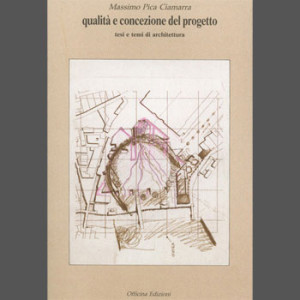MPC, Qualità e concezione del progetto
Officina ed., Roma 1994
Different texts investigate the phase in which an architectural project takes shape, i.e. the phase of its conception.
The design of the project is one of the most delicate motions in the sequence that accompanies all architecture: “need” / “demand” / “programme” / “project” / “realisation”. And in the process that defines the project, it is the phase that has the greatest impact on its quality, even if in terms that are apparently elusive and not measurable.
Several aspects can be distinguished in the construction of the project: the redefinition of the programme, i.e. the questioning of the project’s assumptions: the first condition is that the “question” be posed well, in a technically correct form, anchored to reality, but at the same time projected forward; the architectural conception, i.e. the understanding of the place and the contexts, the creation of the general logic and the input of the meanings on which the dream of transformation that is the basis of the project acts; the technical-projectual definition, i.e. the representation of the project in codified, unitary, coordinated and integrated terms, with different and subsequent in-depth analysis.
The first aspect presupposes complex interweavings, cultural interpretations, multidisciplinary approach. The second is intuition, connection between different problems, patient understanding of the problem: it identifies and organises in space signs that express ideas and concepts. Operational criticism and comparison between alternatives are the main methodological criteria for raising the quality of the project in this phase. On the other hand, technological definitions, integration and congruence between the parts are verifiable qualities that must be carefully measured before starting a realisation.

